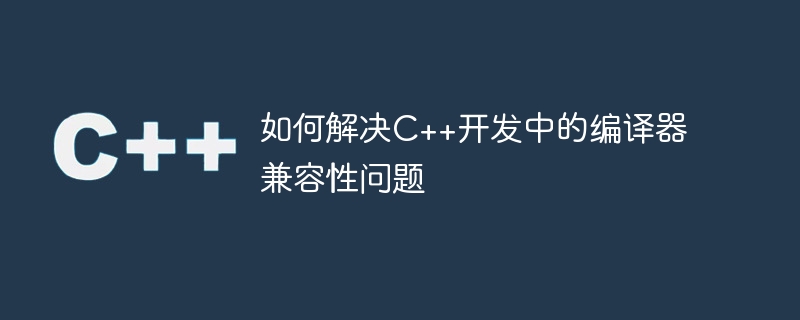

How to solve compiler compatibility issues in C development
In C development, compiler compatibility issues are a challenge that programmers often face. Different compilers may support language standards to varying degrees, producing incompatible results. This brings difficulties to program portability and cross-platform development. In order to solve this problem, we can take the following methods.
First of all, it is crucial to understand the standard support of the target compiler. Different versions of compilers may have varying degrees of support for the C standard. Understanding the C standard version implemented by the target compiler and being familiar with its support for various features can help us avoid using unsupported features or find appropriate compatibility solutions.
Secondly, use standard C libraries and header files. The C standard library provides rich functionality and cross-platform support. Using the standard library's functions and data structures maximizes code portability and avoids compiler compatibility issues. Moreover, the use of the standard library also facilitates code maintenance and reading.
Also, consider using cross-platform development tools and frameworks. Some development tools and frameworks provide cross-platform support, which can shield compatibility issues between different compilers. For example, some cross-platform integrated development environments (IDEs) such as Eclipse and Code::Blocks, as well as cross-platform C frameworks such as Qt, can help us conduct cross-platform development more conveniently.
In addition, writing portable code is also the key to solving compiler compatibility issues. When writing code, we should try to avoid using compiler-related features and optimizations. Try to use standard C syntax and methods, and follow good programming habits and specifications. At the same time, writing clear comments and documentation helps others understand and modify our code. This way, our code is more portable and readable, able to compile and run correctly on different compilers and platforms.
Finally, extensive testing and verification are also necessary steps to ensure code compatibility. After writing the code, we should conduct comprehensive testing, including compilation, linking, running and effect verification. Through continuous testing and debugging, we can discover potential compatibility issues and fix them in a timely manner.
In short, to solve the compiler compatibility problem in C development, we need to understand the standard support of the target compiler, use standard C libraries and header files, choose cross-platform development tools and frameworks, and write code that can Ported code and fully tested and verified. Only by comprehensively applying these methods can we successfully carry out C development work on different compilers and platforms.
The above is the detailed content of How to solve compiler compatibility issues in C++ development. For more information, please follow other related articles on the PHP Chinese website!
 What are the differences between c++ and c language
What are the differences between c++ and c language
 Recommended learning order for c++ and python
Recommended learning order for c++ and python
 Cost-effectiveness analysis of learning python and c++
Cost-effectiveness analysis of learning python and c++
 Is c language the same as c++?
Is c language the same as c++?
 Which is better to learn first, c language or c++?
Which is better to learn first, c language or c++?
 The difference and connection between c language and c++
The difference and connection between c language and c++
 C++ software Chinese change tutorial
C++ software Chinese change tutorial
 Cost-effectiveness analysis of learning python, java and c++
Cost-effectiveness analysis of learning python, java and c++




